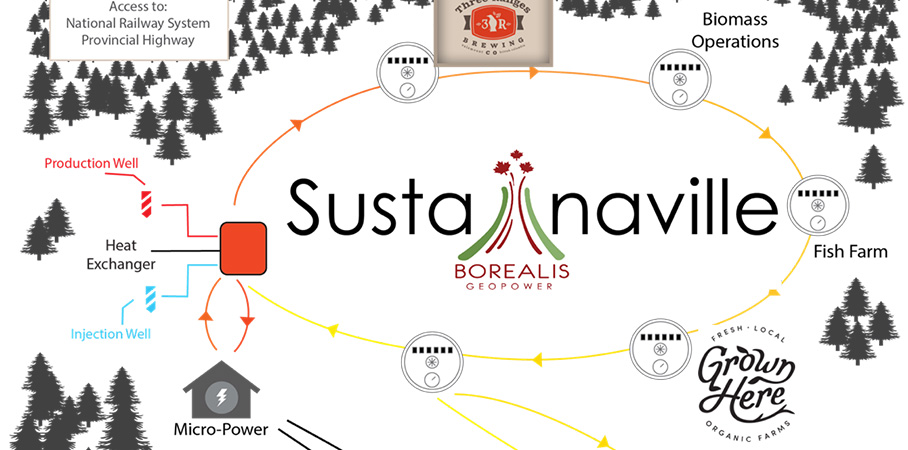
It’s time for a demonstration. It will take place in the village of Valemount, BC. The project, the first of its kind in Canada, is called Sustainaville and will demonstrate that geothermal energy (heat from the earth) can be used to “grow a whole community”.
“Warm geothermal water can support greenhouses but can also support initiatives like a brewery or shrimp farm. This fully renewable resource can serve several tiers of need in the community before being recycled to do it again!”
– Alison Thompson
Geothermal energy will transform Valemount by providing locally grown food using geothermal greenhouses, micro-power for commercial uses, and heat for eco-tourism attractions such as Hot Pools, all with minimal carbon footprint. In the third phase of the development, the project will generate 15MW of power for the community and to the grid, eliminating the current and constant issue of brownouts in the community.
The Sustainaville GeoPark has been designed to build on the success of world class projects in Iceland, USA and Kenya which are using geothermal systems to support industrial processes, commercial applications and households.
“The geothermal energy industry in Canada has had a slow start and as a country we are decades behind the global leaders yet we have world leading geology,” says Alison Thompson, Principal of Borealis GeoPower and Energy Futures Lab Fellow. Borealis was recently recognized by Environment Minister Catherine McKenna as Canada’s leading geothermal companies.
The Sustainaville GeoPark concept goes beyond merely using geothermal energy for heating and energy.
“Geothermal has the potential to help decouple the food chain from fossil fuels, “ says Alison. “Warm geothermal water can support greenhouses but can also support initiatives like a brewery or shrimp farm. This fully renewable resource can serve several tiers of need in the community before being recycled to do it again.”
“According to the Alberta government in 2010, 79% of growers in the province used natural gas. In almost every case, warm geothermal water, plentiful right across the country, could have been substituted as the source of heat,” says Alison. “In an era where 10 calories of oil are used to produce 1 calorie of food, there is a renewable alternative.”
Globally, geothermal power plants currently meet the electricity needs of 60 million people. Companies drill underground for hot water or steam similar to the process of drilling for oil. The heat is brought to the surface and used to spin turbines. The water is then returned underground where it is naturally reheated.
The Sustainaville project applies Alberta honed oil & gas reservoir modelling and drilling talent. The main reason the project is in B.C. is because they have a geothermal program in place for companies to develop electricity, while Alberta does not.
If successful, the project could point to a less costly and quicker development path that would allow for similar projects in some 203 communities, including 78 First Nations communities, who have been identified as potential replication sites. This project is also the only Canadian geothermal energy project accessible to the public to financially participate in on the TSX.
Sustainaville is one of the innovations underway in the Energy Futures Lab’s (EFL’s) Innovation Pathways. In this case it’s the Deployment of Distributed Renewables pathway. The Lab has nine pathways where EFL Fellows come together to innovate, experiment and collaborate toward the Lab’s collective vision of an Alberta energy system that is fit for the future, and where production and consumption is guided by science and aligns with the principles of sustainability.
“It’s been good to be associated with the EFL as a Fellow. Connecting with colleagues, peers and supporters was encouraging and gave me new ideas”, says Alison.
You’ll be hearing a lot more about the initiatives being developed in the Lab in the coming year as the EFL continues to build momentum for a transition to the energy system our future requires.

Michele Longo is the Community Mobilizer for the Energy Futures Lab.



